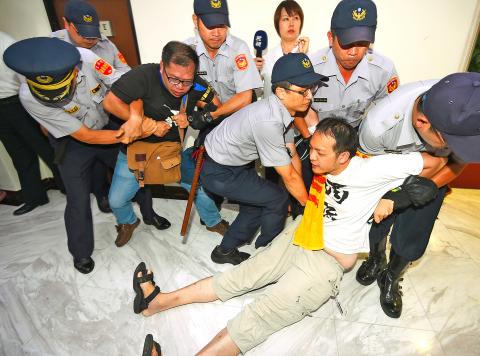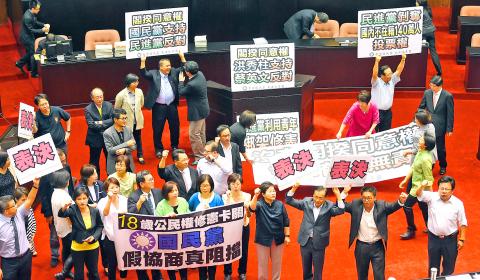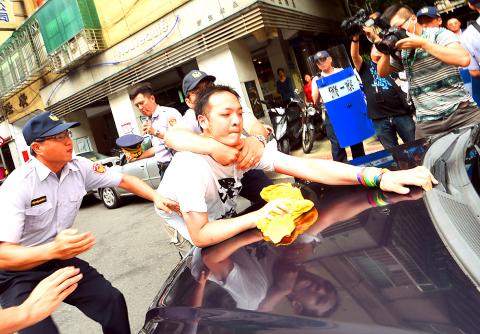Interparty negotiations over constitutional amendments broke down again yesterday, with young protesters, angry over the Chinese Nationalist Party’s (KMT) refusal to separately review controversial amendments on the last day of the legislative session, attempting to storm into KMT caucus whip Lai Shyh-bao’s (賴士葆) office.
The Legislative Yuan had its last plenary meeting yesterday, which was already extended for the legislature to pass the amendments in time for a referendum on the reforms to take place alongside the presidential and legislative elections on Jan. 16. The failure to pass the amendments means the referendum will not take place as planned.
The party caucuses held negotiations yesterday morning intending to iron out the disagreements on how the constitutional amendments should be handled.

Photo: Chang Chia-ming, Taipei Times
The Democratic Progressive Party (DPP) caucus said it proposed that constitutional amendments on which the parties have reached a consensus, such as the lowering of the voting age to 18 and the lowering of the threshold for parties to secure representation in the legislature, be passed in time for the administrative procedures required by the referendum.
It accused the KMT caucus of lacking sincerity with its insistence on bundling amendments for simultaneous legislative passage.
DPP caucus whip Ker Chien-ming (柯建銘) said Lai stressed that it was the KMT leadership pressing for the bundling of the legislature’s power to confirm the premier and absentee voting — the two items that the KMT believes to be the most pressing, but which the DPP opposes — with the lowering of the voting age.

Photo: Chang Chia-ming, Taipei Times
Ker alleged that Lai even proposed a delay to the presidential election — but not the legislative election — which would relieve the pressure for prompt passage of the constitutional amendments, because the referendum, which has to be scheduled on the same day as the elections to guarantee a 50 percent voter turnout for the vote to be valid, could then be postponed to be held with the rescheduled presidential election.
Ker said the KMT, which is likely to nominate Deputy Legislative Speaker Hung Hsiu-chu (洪秀柱) as its presidential candidate, expects a significant challenge for KMT legislative candidates (especially in the south), and that postponing the presidential election — which could allow at least another month for interparty negotiations on the constitutional amendments — would likely reduce Hung’s impact on the legislative election for KMT candidates.
Lai denied proposing the postponement, saying it was put forward by People First Party Legislator Thomas Lee (李桐豪), who, according to Lai, asked DPP Chairperson and presidential candidate Tsai Ing-wen (蔡英文) to promise that she would support allowing the legislature to confirm the premiership.

Photo: Chang Chia-ming, Taipei Times
Lai added that legislative regulations state that bills, unless already having a consensus, could not be put to a vote within one month of negotiations.
A group of young people walked into the building housing legislators’ offices early yesterday afternoon and demanded that Lai answer questions on the issue.
After a standoff with police outside Lai’s office, they were thrown out, with protester Wang Yi-kai (王奕凱) arrested on charges of assault on a police officer.
The protesters demanded to see evidence of Wang’s offense, but said it was not provided.
The police escorted Wang to a patrol car and were able to leave only after a confrontation, in which the protesters blocked the car by lying down in front of it.
DPP Legislator Yu Mei-nu (尤美女) later said that KMT lawmakers failed to appear at an interparty negotiation session scheduled for the afternoon, adding that Lai told her that negotiations were not possible, because of a party leadership directive.
The last general assembly meeting ended at about 6pm, with lawmakers from both parties holding banners and shouting slogans denouncing each other for obstructing the constitutional reforms.

INVESTIGATION: The case is the latest instance of a DPP figure being implicated in an espionage network accused of allegedly leaking information to Chinese intelligence Democratic Progressive Party (DPP) member Ho Jen-chieh (何仁傑) was detained and held incommunicado yesterday on suspicion of spying for China during his tenure as assistant to then-minister of foreign affairs Joseph Wu (吳釗燮). The Taipei District Prosecutors’ Office said Ho was implicated during its investigation into alleged spying activities by former Presidential Office consultant Wu Shang-yu (吳尚雨). Prosecutors said there is reason to believe Ho breached the National Security Act (國家安全法) by leaking classified Ministry of Foreign Affairs information to Chinese intelligence. Following interrogation, prosecutors petitioned the Taipei District Court to detain Ho, citing concerns over potential collusion or tampering of evidence. The

‘FORM OF PROTEST’: The German Institute Taipei said it was ‘shocked’ to see Nazi symbolism used in connection with political aims as it condemned the incident Sung Chien-liang (宋建樑), who led efforts to recall Democratic Progressive Party (DPP) Legislator Lee Kun-cheng (李坤城), was released on bail of NT$80,000 yesterday amid an outcry over a Nazi armband he wore to questioning the night before. Sung arrived at the New Taipei City District Prosecutors’ Office for questioning in a recall petition forgery case on Tuesday night wearing a red armband bearing a swastika, carrying a copy of Adolf Hitler’s Mein Kampf and giving a Nazi salute. Sung left the building at 1:15am without the armband and apparently covering the book with a coat. This is a serious international scandal and Chinese

Seventy percent of middle and elementary schools now conduct English classes entirely in English, the Ministry of Education said, as it encourages schools nationwide to adopt this practice Minister of Education (MOE) Cheng Ying-yao (鄭英耀) is scheduled to present a report on the government’s bilingual education policy to the Legislative Yuan’s Education and Culture Committee today. The report would outline strategies aimed at expanding access to education, reducing regional disparities and improving talent cultivation. Implementation of bilingual education policies has varied across local governments, occasionally drawing public criticism. For example, some schools have required teachers of non-English subjects to pass English proficiency

TRADE: The premier pledged safeguards on ‘Made in Taiwan’ labeling, anti-dumping measures and stricter export controls to strengthen its position in trade talks Products labeled “made in Taiwan” must be genuinely made in Taiwan, Premier Cho Jung-tai (卓榮泰) said yesterday, vowing to enforce strict safeguards against “origin laundering” and initiate anti-dumping investigations to prevent China dumping its products in Taiwan. Cho made the remarks in a discussion session with representatives from industries in Kaohsiung. In response to the US government’s recent announcement of “reciprocal” tariffs on its trading partners, President William Lai (賴清德) and Cho last week began a series of consultations with industry leaders nationwide to gather feedback and address concerns. Taiwanese and US officials held a videoconference on Friday evening to discuss the